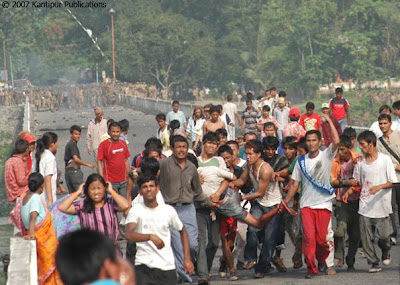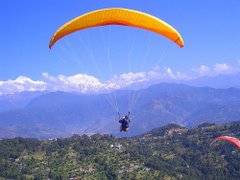BY CHETAN ADHIKARI IN DAMAK, UPENDRA POKHAREL IN KAKARBHITTA & TILAK POKHAREL IN KATHMANDU
 KATHMANDU, May 28 - While violence in the Bhutanese refugee camps that started on Sunday took a nasty turn a day later with one more death and dozens more injuries, the turmoil has only been exacerbated as India was on Monday directly dragged into the refugee crisis.
KATHMANDU, May 28 - While violence in the Bhutanese refugee camps that started on Sunday took a nasty turn a day later with one more death and dozens more injuries, the turmoil has only been exacerbated as India was on Monday directly dragged into the refugee crisis. With the death of a refugee, Purna Bahadur Tamang at Beldangi-II camp, the toll reached two on Monday. Tamang, who was injured seriously after he being hit on his back by a police-fired plastic bullet, succumbed to his wounds while undergoing treatment at Amda Hospital. Police had resorted to opening fire after refugees staging demonstrations defying the curfew didn't budge an inch. Eighteen each from the police and demonstrators were injured in the clash.
The condition of two of the 18 injured policemen - DSP Krishna Raj Pathak and assistant head constable Prem Chaudhary - is critical, according to Superintendent of Police Naresh Karki of the Armed Police Force, Pathibhara Battalion. Four of the 18 refugees were injured by rubber bullets. On Sunday, Narapati Dhungel, an eighth grader, had died after being hit by bullets fired by police to disperse the demonstrators pelting stones at them.
Though refugee activists have accused police of "provoking" refugees assembled for Dhungel's funeral procession, police said the situation turned tense when they stopped refugees from marching toward an office of the United Nations High Commissioner for Refugees (UNHCR) by defying curfew orders. In a statement in Kathmandu, UNHCR has appealed to the refugees to abide by the laws of the host country.
 Police resorted to firing in the air and also fired dozens of teargas shells to disperse the refugees pelting stones at them. Gunshots were heard for around two hours in the area, according to locals. More police reinforcements were mobilized in the area from Kankalini battalion Pakali, Siddhakali battalion Itahari and Urlabari Base Camp after Pathibhara battalion was unable to bring the situation under control.
Police resorted to firing in the air and also fired dozens of teargas shells to disperse the refugees pelting stones at them. Gunshots were heard for around two hours in the area, according to locals. More police reinforcements were mobilized in the area from Kankalini battalion Pakali, Siddhakali battalion Itahari and Urlabari Base Camp after Pathibhara battalion was unable to bring the situation under control. UNHCR Representative Abraham Abraham said the turmoil in the camps was "a disturbing state of affairs". All humanitarian activities couldn't be carried out in the camps, Monday.
 The whole crisis had started on Sunday after some "Maoist refugees", who have been pushing for respectful repatriation to Bhutan while vehemently opposing third country resettlement offers from the US and other countries, thrashed a pro-resettlement refugee activist (Hari Bangale). When police reached there to rescue Bangale, the refugees attacked them, prompting the former to start firing.
The whole crisis had started on Sunday after some "Maoist refugees", who have been pushing for respectful repatriation to Bhutan while vehemently opposing third country resettlement offers from the US and other countries, thrashed a pro-resettlement refugee activist (Hari Bangale). When police reached there to rescue Bangale, the refugees attacked them, prompting the former to start firing. India's attempt to stop refugees turns violent
 More fuel was added to the flame after Indian security forces' attempt on Monday to stop hundreds of refugee activists trying to march toward Bhutan via India turned violent. Over a dozen refugees sustained injuries as Indian forces deployed along Nepal-India border resorted to baton-charge and fired tear gas shells at Mechi Bridge. Indian forces have arrested 28 refugees, of whom 26 are women.
More fuel was added to the flame after Indian security forces' attempt on Monday to stop hundreds of refugee activists trying to march toward Bhutan via India turned violent. Over a dozen refugees sustained injuries as Indian forces deployed along Nepal-India border resorted to baton-charge and fired tear gas shells at Mechi Bridge. Indian forces have arrested 28 refugees, of whom 26 are women.Accompanied by Indian lawmakers (Dr Sunalim Mishra and Brijbhushan Tiwari, among others) and Nepal's political party leaders, the refugees had reached there on the first day of their "Long March" toward home, but to be returned and arrested by SSB forces. Those being returned have been staging a sit-in protest on the Bridge.
 Thinley Penjore, chairman of National Front for Democracy Bhutan which was the organizer of the campaign; Balaram Poudel, DB Rana Sampang and Gup Khilla, all vice chairmen of the organization; and human rights leader DP Kafle, were among those injured in India's crackdown. The injured have been admitted in hospitals in Kakarbhitta, Birtamod, Dhulabari and Bhadrapur.
Thinley Penjore, chairman of National Front for Democracy Bhutan which was the organizer of the campaign; Balaram Poudel, DB Rana Sampang and Gup Khilla, all vice chairmen of the organization; and human rights leader DP Kafle, were among those injured in India's crackdown. The injured have been admitted in hospitals in Kakarbhitta, Birtamod, Dhulabari and Bhadrapur. Indian forces had used force after the refugees forcibly attempted to make their way. The Nepal-India border was sealed from Sunday, while a huge number of security personnel were deployed to foil the refugees' attempt.
Though the organizers "Long March" campaign aimed to assemble over 15,000 refugees at Mechi Bridge, violence in the camp made it impossible.
Most of the 106,000 refugees of Nepali-origin, evicted from Bhutan in the early 1990s in an ethnic cleansing, blame India - which has a huge amount of influence over the Druk regime - of not doing anything to ensure their voluntary repatriation.
A disturbing state of affairs: UNHCR
Expressing "grave concern" over the violence that has "alarmed" him, UNHCR representative Abraham has termed the violence "a disturbing state of affairs" while earnestly calling upon all refugees and concerned parties to resolve the matter peacefully.
Expressing "grave concern" over the violence that has "alarmed" him, UNHCR representative Abraham has termed the violence "a disturbing state of affairs" while earnestly calling upon all refugees and concerned parties to resolve the matter peacefully.
"The situation continues to be tense in the camp which seems to have spilled over to other refugee camps in the eastern region," said the statement, adding that UNHCR is reviewing its daily presence in the camps, until the situation stabilizes, for security of staff and UN property.
The UN refugee agency also expressed its concern that prolongation of the deteriorating security situation in the camps could affect its humanitarian operation, as well as the smooth delivery of food in the camps by the UN World Food Program (WFP).
The UN refugee agency also expressed its concern that prolongation of the deteriorating security situation in the camps could affect its humanitarian operation, as well as the smooth delivery of food in the camps by the UN World Food Program (WFP).
Lutheran World Federation (LWF), the only implementing INGO of UNHCR, said it couldn't carry out any activity inside the camps on Monday. "LWF's Eastern Region Coordination Unit couldn't carry out any 'normal care and maintenance activities' inside the seven camps," said Beena Kharel, LWF's Communications and Documentation Manager. "We are waiting and watching and we hope that the situation improves and we will be able to carry out normal activities."
Besides UNHCR and LWF, Caritas and WFP are other agencies providing humanitarian support to refugees.
Source: Kathmandu Post
Posted on: 2007-05-28 20:57:12


1 comment:
I hate Indian double standard, when they can let them, why can't they let them leave.
Post a Comment